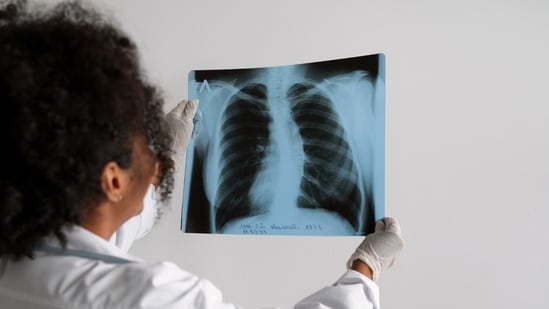Lung cancer is one of the deadliest cancers, with 64 percent survival rates for early detection but only 8 percent for advanced stages. It accounts for an estimated 2 million diagnoses and 1.8 million deaths, as per the National Institutes of Health.
 Not every cough is harmless, and not every lung cancer story begins with a cigarette. (Freepik)
Not every cough is harmless, and not every lung cancer story begins with a cigarette. (Freepik)
Now, with growing pollution and other lifestyle changes, the risk of lung cancer is also increasing. HT Lifestyle reached out to Dr Satheesh CT, senior consultant, medical oncology, HCG Cancer Hospitals, K R Road, Bengaluru, to shed light on why there is a prevalence of cancer, particularly among non-smokers. “Not every cough is harmless, and not every lung cancer story begins with a cigarette,” the oncologist in turn cautioned.
Why is lung cancer rising among non-smokers?
Shedding light on the fact that lung cancer is not confined to smokers only, Dr Satheesh warned, “Across the country, a greater number of non-smokers are being diagnosed with lung cancer, highlighting a concerning trend in the country’s cancer landscape.”
 Across the country, a greater number of non-smokers are being diagnosed with lung cancer. (Unsplash)
Across the country, a greater number of non-smokers are being diagnosed with lung cancer. (Unsplash)
The oncologist stated that the reason is that homemakers are exposed to kitchen smoke, children, and people commuting to the workplace, all of whom breathe in polluted air. “The PM2.5 has the tendency to enter our bloodstream, making our organs exposed and vulnerable to carcinogens,” he added.
Lung cancer cases among non-smokers are rising in India, with approximately 25-40 percent of cases occurring in non-smokers. Therefore, this sudden shift in the increasing influence of air pollution, second-hand smoke, and genetic predisposition is driving the increase in the number of cases amongst non-smokers.
What this means in practical terms for caregivers and patientsRecognise early warning signs
Dr Satheesh highlighted that in the case of non-smokers, lung cancer may appear as a persistent dry cough, breathlessness on exertion, unexplained fatigue, or chest discomfort and weight loss, while in smokers, it may vary with coughing up blood, wheezing and recurring infections.
“As a caregiver, if such symptoms persist beyond a usual cold/flu, especially in someone exposed to pollution or indoor smoke, seek a specialist opinion,” he advised.
Choose a treatment centre and test wisely
Next, he recommended, “Non-smoker lung cancer may benefit more from targeted therapies (e.g., those aimed at genetic mutations) than traditional treatment alone. Ask whether the oncologist checks for gene mutations (EGFR, ALK, etc) and whether contemporary management pathways are available.”
 Encourage overall lung health: regular check-ups, prompt attention to respiratory symptoms, a healthy diet, and regular physical activity. (Freepik) Promote preventive and protective habits
Encourage overall lung health: regular check-ups, prompt attention to respiratory symptoms, a healthy diet, and regular physical activity. (Freepik) Promote preventive and protective habits
Although one cannot reverse genetics, one can reduce exposure, according to the oncologist. He suggests:
Good kitchen ventilation and safer cooking habits help keep indoor air clean and protect your family from lung-related diseases, including cancer.Limit outdoor activities when pollution levels are high and wear a mask when outdoors or in polluted areas. This can significantly reduce exposure to harmful air pollutants and lower the risk of lung cancer.Keeping homes smoke-free is crucial, as non-smokers living with smokers are at a significantly higher risk of developing lung cancer due to second-hand smoke exposure.Encourage overall lung health: regular check-ups, prompt attention to respiratory symptoms, a healthy diet, and regular physical activity.
Lastly, Dr Satheesh warned, “Lung cancer in India is no longer a smoker’s disease. The growing number of non-smoker cases marks a quiet but crucial shift, one that calls for awareness, not alarm.”
“The air we breathe, the fuels we use, the homes we build, and how quickly we respond to persistent coughs or breathlessness all shape our lung health. Small, mindful actions can make a big difference: noticing symptoms early, seeking a specialist’s opinion, and choosing cleaner habits at home,” he added.
Note to readers: This article is for informational purposes only and not a substitute for professional medical advice. Always seek the advice of your doctor with any questions about a medical condition.

